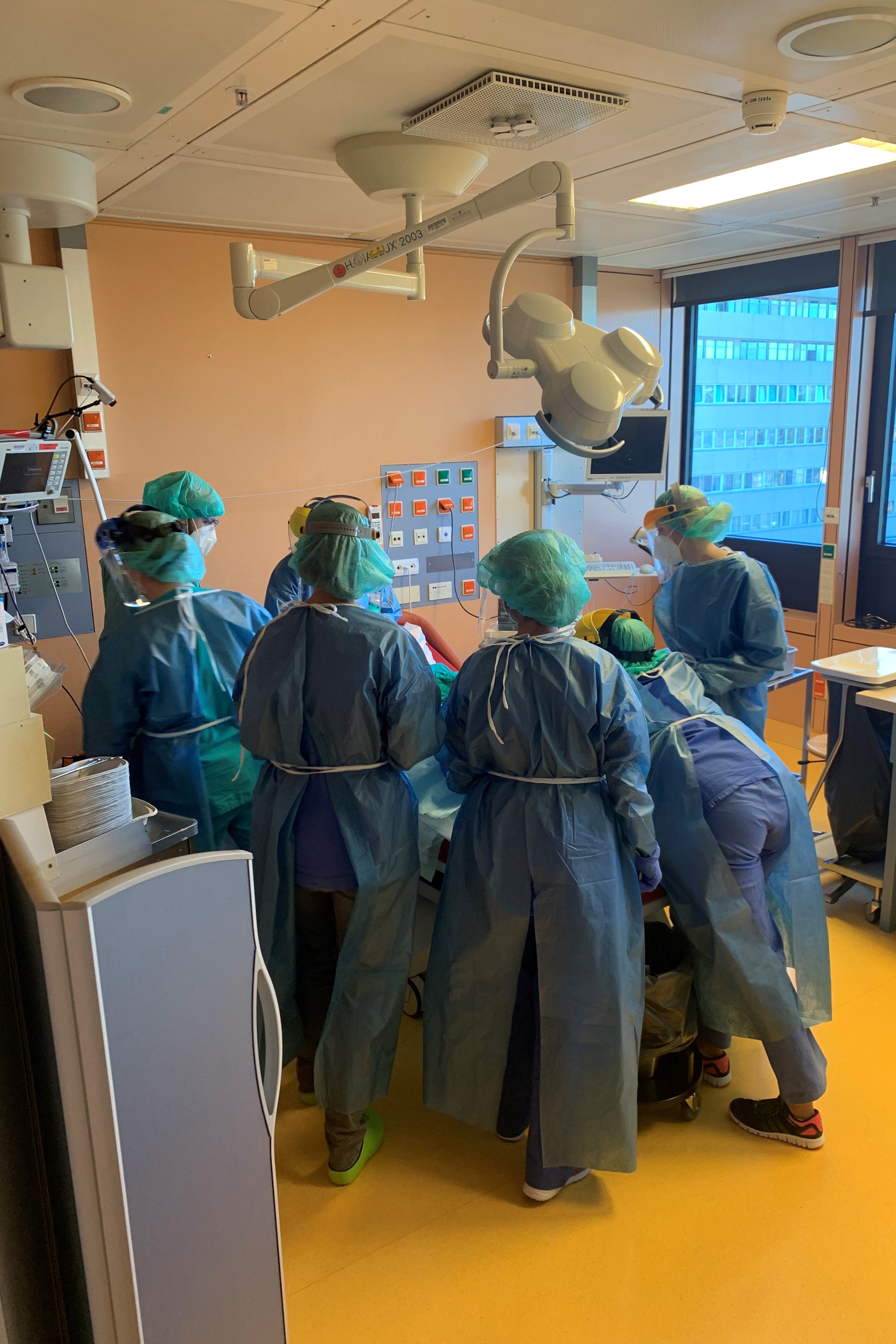
(Vienna, 04 December 2020) This time, the 8th (17 – 20 November 2020) interdisciplinary simulation training course organised by the Division of Obstetrics and Feto-Maternal Medicine of the Department of Obstetrics and Gynecology and the Department of Anaesthesia, Critical Care and Pain Medicine at MedUni Vienna and Vienna General Hospital reflected the realities of the COVID-19 pandemic and the associated enhanced protective measures for medical staff. Acute, unforeseeable events were simulated using "Noelle", the simulation dummy.
The delivery-room training course was organised under the leadership of Dagmar Bancher, Alex Farr and Herbert Kiss together with Bernhard Rössler and Karl Schebesta (Medical Simulation and Patient Safety Team) of the Division of General Anesthesia.
Interdisciplinary simulation is the method of choice for perfecting medical procedures and complex sequences. The training courses contain all 3 elements of problem solving (skills, algorithms and guidelines as well as non-technical skills).
Acute, unforeseeable situations, which are easy to practice using high fidelity, were simulated in this year’s training course. The individual steps of the COVID-19 precautions were practised, including donning and doffing protective clothing and separating patient streams (potentially infectious versus non-infectious) in an acute situation. The participating doctors, midwives and nursing staff were immersed in the acute event and had to overcome the emergency situation step-by-step under the extraordinary prevailing conditions.
The training outcomes were the structured development and scenario-based training of the current management guidelines for COVID-19. Particular emphasis was placed on team-working and non-technical skills.
Following a theoretical introduction to the international and in-house guidelines, the real-time scenario was played out. A hot debriefing was carried out using video recording and direct transmission to the outside. All the professional groups involved in the delivery room, such as midwives, obstetricians, anaesthetists and anaesthesia nurses, were actively involved in the training course. The multidisciplinary bias served to optimise the interfaces and to foster mutual understanding of the complex event.
"The current pandemic situation creates huge clinical challenges for us, since, in obstetrics, we are already confronted by acute situations, even without the potential for a Covid-positive woman, who, under certain circumstances, might be symptomatic. However, in some cases, these patients need to be rapidly intubated by the anaesthetists," explains Alex Farr. "The extremely positive feedback we received from the participants strengthens our resolve to continue offering training courses like these over the next few years, even after the pandemic."
Neonatology training for midwives and obstetricians
Following on from the interdisciplinary simulation training course in the delivery room, a neonatology course was held for midwives and obstetricians, in collaboration with the simulation team from the Division of Neonatalogy, Intensive Care Medicine and Neuropediatrics. Alongside the theory of newborn life support, the aim of this course was to offer practical training in basic newborn life support and resuscitation in small interprofessional groups, followed by structured debriefing. The course also encouraged interdisciplinary exchange, which is particularly important for patient safety in the care of newborns.
"As the constant contact for the patients, midwives are usually close to the action and must be able to react and communicate adequately in an emergency. Smooth interaction within the interdisciplinary team is particularly important in the care of patients with obstetric emergencies. In addition to their professional qualifications, this also includes the ability to communicate with each other. Both of these aspects are promoted by the course," says Christa Hauser-Auzinger, Head of Midwifery Services in University Hospital Vienna.
Over the course of the next few years, the intention is to develop and expand neonatology simulation training in the wake of closer interdisciplinary collaboration within the Comprehensive Center for Pediatrics.